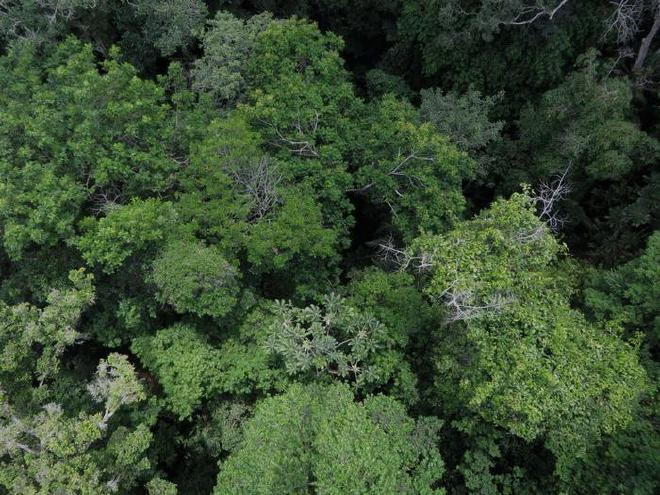
Led by Dr Jesús Aguirre-Gutiérrez, from the University of Oxford’s Environmental Change Institute (ECI), and involving researchers from the University of Adelaide, the study saw more than 100 scientists and local partners analyse data from 415 permanent forest plots, spanning Mexico to southern Brazil.

By examining the traits of more than 250,000 trees, the team assessed how different species are responding to shifting temperatures and rainfall patterns.
“Due to how rapidly climate change is altering temperature and precipitation patterns, tree communities are responding too slowly to remain in equilibrium with their environment,” said Dr Sami Rifai, a lecturer from the University of Adelaide’s School of Biological Sciences.
“By 2100, temperatures in the region could rise by up to 4°C, with rainfall decreasing by as much as 20 per cent. This could push tropical forests further out of balance, making them more vulnerable to extreme climate events.”
The study, published in Science, was completed using field data taken from the forest plots.
“This study pulled together data covering a dozen different functional traits – such as leaf size, wood density and maximum height – from over a thousand tree species,” says Dr Rifai.
“These plant functional trait measurements were then paired with tree species composition data collected from 415 forest plots where growth, mortality, and recruitment were tracked for more than a quarter million trees to characterise how these forests have changed over the past 40 years.
“Next, this 40-year change in the plant functional traits of the forest plots was compared to how it might be expected to change if these forests’ functional traits were changing proportionately to the last 40 years of climate change.
“Rather than keeping pace with a changing climate, it was found that the functional traits from these hundreds of forest plots had shifted by less than 8 per cent of what would be required to track changes in climate.
“This is a worrying finding given the importance of tropical rainforests for sustaining species diversity and the functioning of the terrestrial biosphere.”
Tropical rainforests play a vital role in global climate regulation and biodiversity conservation, but their ability to adapt to climate change is limited. This study shows a way forward for conservationists looking to preserve this vital function.
“By looking at individual trees from different communities, we found some have suffered due to climate shifts, while others have thrived,” says Dr Aguirre-Gutiérrez.
“If we know what species of trees are doing better or worse, and what set of traits they have, then we know what they can withstand. It will help inform what conservation actions should be encouraged and where funding should be allocated.”
- The paper Tropical forests in the Americas are changing too slowly to track climate change was published in Science. Authors: Jesús Aguirre-Gutiérrez, Sandra Díaz, Sami W. Rifai, Jose Javier Corral-Rivas, Maria Guadalupe Nava-Miranda, Roy González-M, Ana Belén Hurtado-M, Norma Salinas Revilla, Emilio Vilanova, Everton Almeida, Edmar Almeida de Oliveira, Esteban Alvarez-Davila, Luciana F. Alves, Ana Cristina Segalin de Andrade, Antonio Carlos Lola da Costa, Simone Aparecida Vieira, Luiz Aragão, Eric Arets, Gerardo A. Aymard C., Fabrício Baccaro, Yvonne Vanessa Bakker, Timothy R. Baker, Olaf Bánki, Christopher Baraloto, Plínio Barbosa de Camargo, Erika Berenguer, Lilian Blanc, Damien Bonal, Frans Bongers, Kauane Maiara Bordin, Roel Brienen, Foster Brown, Nayane Cristina C. S. Prestes, Carolina V. Castilho, Sabina Cerruto Ribeiro, Fernanda Coelho de Souza, James A. Comiskey, Fernando Cornejo Valverde, Sandra Cristina Müller, Richarlly da Costa Silva, Julio Daniel do Vale, Vitor de Andrade Kamimura, Ricardo de Oliveira Perdiz, Jhon del Aguila Pasquel, Géraldine Derroire, Anthony Di Fiore, Mathias Disney, William Farfan-Rios, Sophie Fauset, Ted R. Feldpausch, Rafael Flora Ramos, Gerardo Flores Llampazo, Valéria Forni Martins, Claire Fortunel, Karina Garcia Cabrera, Jorcely Gonçalves Barroso, Bruno Hérault, Rafael Herrera, Eurídice N. Honorio Coronado, Isau Huamantupa-Chuquimaco, John J. Pipoly, Katia Janaina Zanini, Eliana Jiménez, Carlos A. Joly, Michelle Kalamandeen, Joice Klipel, Aurora Levesley, Wilmar Lopez Oviedo, William E. Magnusson, Rubens Manoel dos Santos, Beatriz Schwantes Marimon, Ben Hur Marimon-Junior, Simone Matias de Almeida Reis, Omar Aurelio Melo Cruz, Abel Monteagudo Mendoza, Paulo Morandi, Robert Muscarella, Henrique Nascimento, David A. Neill, Imma Oliveras Menor, Walter A. Palacios, Sonia Palacios-Ramos, Nadir Carolina Pallqui Camacho, Guido Pardo, R. Toby Pennington, Luciana de Oliveira Pereira, Georgia Pickavance, Rayana Caroline Picolotto, Nigel C. A. Pitman, Adriana Prieto, Carlos Quesada, Hirma Ramírez-Angulo, Maxime Réjou-Méchain, Zorayda Restrepo Correa, José Manuel Reyna Huaymacari, Carlos Reynel Rodriguez, Gonzalo Rivas-Torres, Anand Roopsind, Agustín Rudas, Beatriz Salgado Negret, Masha T. van der Sande, Flávia Delgado Santana, Flavio Antonio Maës Santos, Rodrigo Scarton Bergamin, Miles R. Silman, Camila Silva, Javier Silva Espejo, Marcos Silveira, Fernanda Cristina Souza, Martin J. P. Sullivan, Varun Swamy, Joey Talbot, John J. Terborgh, Peter J. van der Meer, Geertje van der Heijden, Bert van Ulft, Rodolfo Vasquez Martinez, Laura Vedovato, Jason Vleminckx, Vincent Antoine Vos, Verginia Wortel, Pieter A. Zuidema, Joeri A. Zwerts, Susan G. W. Laurance, William F. Laurance, Jerôme Chave, James W. Dalling, Jos Barlow, Lourens Poorter, Brian J. Enquist, Hans ter Steege, Oliver L. Phillips, David Galbraith & Yadvinder Malhi.

